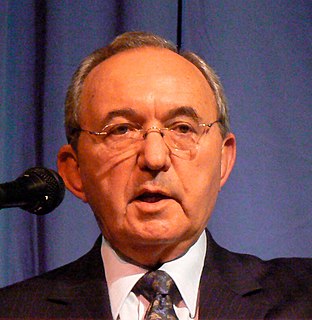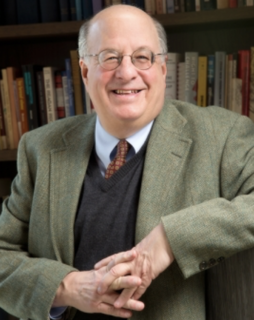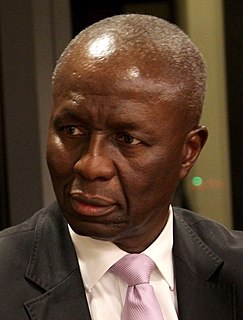Related Research Articles

The International Criminal Tribunal for the former Yugoslavia (ICTY) was a body of the United Nations that was established to prosecute the war crimes that had been committed during the Yugoslav Wars and to try their perpetrators. The tribunal was an ad hoc court located in The Hague, Netherlands.

Richard Joseph Goldstone is a South African former judge. After working for 17 years as a commercial lawyer, he was appointed by the South African government to serve on the Transvaal Supreme Court from 1980 to 1989 and the Appellate Division of the Supreme Court of South Africa from 1990 to 1994.

The Constitutional Court of South Africa is a supreme constitutional court established by the Constitution of South Africa, and is the apex court in the South African judicial system, with general jurisdiction.

Edwin CameronSCOB is a retired judge who served as a Justice of the Constitutional Court of South Africa. He is well known for his HIV/AIDS and gay-rights activism and was hailed by Nelson Mandela as "one of South Africa's new heroes". President Ramaphosa appointed him as Inspecting Judge of Correctional Services from 1 January 2020 and in October 2019 he was elected Chancellor of Stellenbosch University.

A supreme court is the highest court within the hierarchy of courts in many legal jurisdictions. Other descriptions for such courts include court of last resort, apex court, and highcourt of appeal. Broadly speaking, the decisions of a supreme court are not subject to further review by any other court. Supreme courts typically function primarily as appellate courts, hearing appeals from decisions of lower trial courts, or from intermediate-level appellate courts.

The judiciaries of the United Kingdom are the separate judiciaries of the three legal systems in England and Wales, Northern Ireland and Scotland. The judges of the Supreme Court of the United Kingdom, the Special Immigration Appeals Commission, Employment Tribunals, Employment Appeal Tribunal and the UK tribunals system do have a United Kingdom–wide jurisdiction but judgments only apply directly to the jurisdiction from which a case originates as the same case points and principles do not inevitably apply in the other jurisdictions. In employment law, employment tribunals and the Employment Appeal Tribunal have jurisdiction in the whole of Great Britain.

National Coalition for Gay and Lesbian Equality and Another v Minister of Justice and Others is a decision of the Constitutional Court of South Africa which struck down the laws prohibiting consensual sexual activities between men. Basing its decision on the Bill of Rights in the Constitution – and in particular its explicit prohibition of discrimination based on sexual orientation – the court unanimously ruled that the crime of sodomy, as well as various other related provisions of the criminal law, were unconstitutional and therefore invalid.

Mark Lawrence Wolf is a Senior Judge for the United States District Court for the District of Massachusetts and founder and chair of Integrity Initiatives International.

Dikgang Ernest Moseneke is a South African judge and former Deputy Chief Justice of South Africa.
O-Gon Kwon is a noted international South Korean judge, best known for being one of the three judges in the trial of Slobodan Milošević. He also sat on the bench for the trial of former Bosnian Serb leader Radovan Karadžić.

United Nations Security Council resolution 936, adopted unanimously on 8 July 1994, after reaffirming resolutions 808 (1993) and 827 (1994), the Council appointed Richard Goldstone, a judge at the Constitutional Court of South Africa, as Prosecutor at the International Criminal Tribunal for the former Yugoslavia (ICTY).
References
- "Overview of the judgments of the Constitutional Court of South Africa since 1994 to 2005" (PDF). June 2011. Retrieved 20 October 2012.
- "1995 South Africa: Constitutional Court Decisions". SAFLII. Retrieved 22 January 2011.
